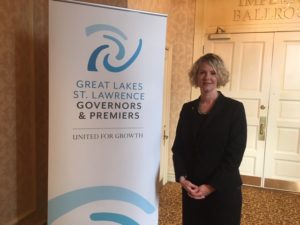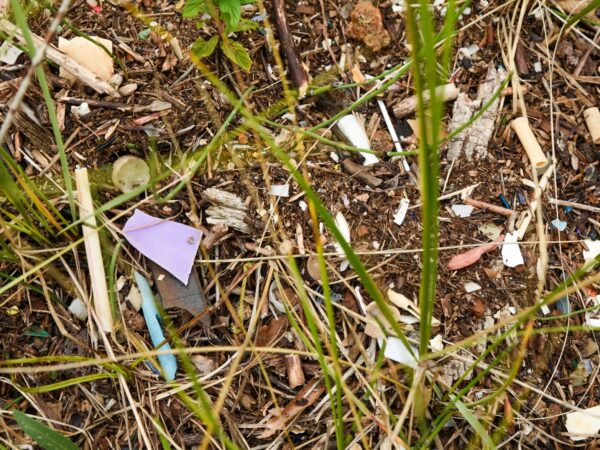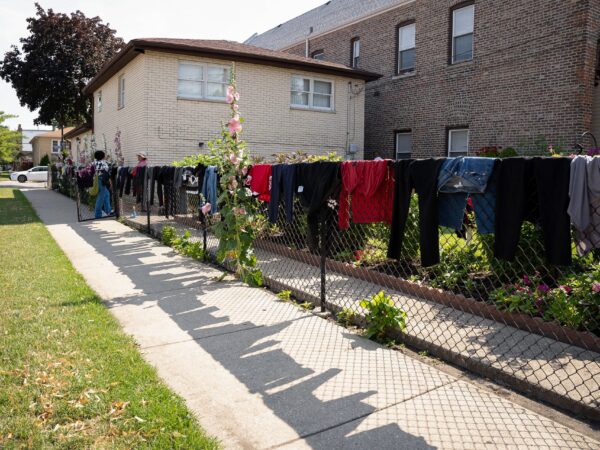
Elevate the Great Lakes.
That’s the thinking behind Michigan Gov. Gretchen Whitmer’s recent overhaul of the Department of Environmental Quality, says the woman who will lead the newly retitled Environment, Great Lakes and Energy office.

Liesl Eichler Clark, Director of the Michigan Department of Environment, Great Lakes, and Energy, Photo by Gary Wilson
“The Great Lakes are foundational to everything we do,” said Liesl Eichler Clark, the director of the 1,200-person agency.
Indeed, both peninsulas of Michigan are part of the Great Lakes watershed, the only state of the basin’s eight states and two provinces to have such a claim. Michigan’s distinctive peninsular borders outline parts of four of the five lakes, and these massive freshwater seas are inextricably tied to the state’s economy, history, culture and identity.
But Whitmer, elected last year, still “wanted to elevate the role of policy work for the Great Lakes and that is reflected in the agency’s new title,” Clark said. It’s also in Whitmer’s executive order where she said the agency “should serve as a full-time guardian of the Great Lakes, our freshwater, and our public water supplies.”
Clark, who was on Whitmer’s transition team, spoke with Great Lakes Now and said the experience planning the new administration’s work also helped her plan for the reorganization that would focus on the Great Lakes.
In a wide-ranging interview in Milwaukee earlier this month where Clark was attending a regional conference, Clark discussed reorganizing the former DEQ, the Nestle bottled water case that is pending a legal decision and environmental justice.
Is the new name more than a rebranding?
Great Lakes Now asked Clark if the EGLE reorganization was at least in part a rebranding driven by a desire to help the DEQ shed its role and legacy in the Flint water crisis.
Clark did not respond concerning Flint as a driver for the reorganization. She instead said it was important to have public policy work and regulatory work in one place and that’s what drove the reorganization. She doesn’t see the move as a “rebranding” but a reorganization of the former DEQ.
The name of agency “doesn’t really matter,” Clark said, adding she prefers to focus on the everyday work of protecting public health and the environment.
“A transition is a terrible thing to waste,” Clark said and described how she is using it to get ideas from staff to improve the department.
“All bureaucracies have a tendency to develop into group think,” Clark said. She wanted to hear ideas that newcomers could bring from other work settings in addition to input from experienced staff.
WILL IT MATTER?
But from a user of services perspective, nothing has changed since the transition to EGLE, Central Michigan University professor Don Uzarski told Great Lakes Now.
Uzarski oversees a major wetland research program that requires him to interface with EGLE and the Department of Natural Resources.
“We need to see more cooperation between EGLE and the DNR in some areas,” Uzarski said without assigning blame. ”It just needs to happen.”
Bottled water test looms
An early test for the Whitmer administration will be how EGLE handles the appeal of the Snyder administration’s April 2018 decision to allow Nestle to take more water for bottled water. A legal decision is pending after a challenge from Michigan Citizens for Water Conservation, a grassroots environmental group.
Watch Great Lakes Now’s Emmy-winning documentary about the Nestle situation: “Tapping the Great Lakes”
During her 2018 campaign, Whitmer said on her website “… we need a way to control the siphoning of water for water bottling and my administration will work to see it done.”
The Nestle appeal is before an administrative law judge who is expected to announce a decision within a few months, according to Clark.
With Flint’s water problems not far removed from the spotlight, the DEQ’s decision to allow the withdrawal for commercial bottling by a private company again was seen by many as problematic.
The decision “represents yet another fundamental failure by the agency to safeguard Michigan’s precious water resources,” said Lisa Wozniak when the decision was announced. Wozniak is the executive director of the Michigan League of Conservation Voters.
The permit was granted in spite of public comments that were overwhelmingly against it.
Former Gov. Rick Snyder told Great Lakes Now before leaving office that he was cognizant of public sentiment, but his administration was required to follow the law in granting the permit.
While the law judge will rule on the validity of the permit, the final decision rests with Clark.
And Clark said she will approach the decision “like all other decisions I make for EGLE which means that it needs to be fueled by science to make sure that we are data driven, as we need to be as an agency.
“It needs to meet with our values, our mission of protecting the environment and public health and managing wisely our resources. It also needs to be structured by statute,” Clark said. “That said, statute doesn’t create a lot swaying of the decision based on public opinion,” Clark said.
Elevating Environmental Justice
With cities like Flint and areas of Detroit as the backdrop as minority populations bear a disproportionate burden of environmental problems, Clark said environmental justice is a priority for Whitmer and that’s why is was included in the executive order that created EGLE.
She wants the agency to look at environmental justice through a broader lens. Acknowledging the decades of disinvestment in urban communities that create environmental problems, she said it also needs to be an 83-county discussion, meaning statewide.
“It’s not just urban communities but also rural communities and frankly, how do we communicate with our tribal communities as well,” Clark said. “The governor said a few times that it’s really important that state government reflect what our state looks like, and I think that to be true as well.”
In March of 2018 the administration of former Gov. Rick Snyder released a state-wide environmental justice report and one of the recommendations was to put an added emphasis on environmental justice related to Michigan’s Tribes.
EGLE will “build on the foundation of work that happened under previous administrations,” Clark said.
Featured Image: Under Construction Grunge Sign, Image by Nicolas Raymond via flickr.com cc 2.0
1 Comment
-
Might want to ask why the Michigan Office of the Great Lakes was just abolished. Baffles me!





